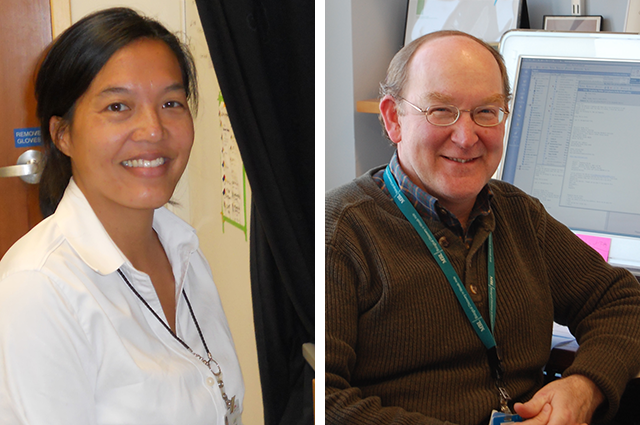GSBS Congratulates Lucy Liaw and Philip Hinds - Recipients of Zucker Research Prizes

Lucy Liaw, PhD - The Milton O. Zucker, MD, FACS, and Natalie V. Zucker Award Recipient
Lucy Liaw, PhD is Professor at Tufts University School of Medicine and a member of the CMDB graduate program. Her primary appointment is at Maine Medical Center Research Institute at MaineHealth. Throughout her career, she has been committed to understanding vascular biology, and the cell and molecular basis of cardiovascular health and disease. She started her independent research program at Maine Medical Center in 1998, and has since been active in developing the overall research portfolio of Maine Medical Center Research Institute, participating in Centers of Excellence in Angiogenesis, Vascular Biology, and currently leading a Center of Biomedical Research Excellence in Metabolic Networks. She has been a faculty member in the Department of Medicine at Tufts since 2010. In her own program, her contributions include identification and characterization of key pathways involved in vascular remodeling and repair, including extracellular matrix proteins such as secreted phosphoprotein 1 and transcriptional mediators such as the Notch and TGFbeta signaling pathway. Her work has defined important signaling pathways, particularly in vascular smooth muscle cells, that regulate the pathological phenotype of blood vessels. She has performed foundational work in understanding the interactions between perivascular adipose tissue and the blood vessel wall, and performed some of the first characterization of this unique adipose depot in humans, identifying novel markers and pathways that regulate the differentiation of human perivascular adipose progenitor cells. These studies have translational implications to promoting vascular health by targeting signaling pathways in blood vessels and adipose tissue in the vascular microenvironment. Through her leadership of a mouse genome modification resource for the past twenty years, her group has also contributed broadly to research by the development of multiple mouse models of human disease. In addition to her outstanding research, she is a strong advocate for trainees and early career investigators, and has a dedicated interest in mentorship and supporting professional development in research careers.
Philip Hinds, PhD - Zucker Family Prize Recipient
Philip Hinds, PhD is a Professor at Tufts University School of Medicine and former chair of the Department of Developmental, Molecular and Chemical Biology (DMCB). He is a member of the CMDB ad Genetics programs and directs the MS in Biomedical Management at GSBS. He arrived at Tufts Medical Center in 2003 after ten years as Assistant and Associate Professor of Pathology at Harvard Medical School. He moved to TUSM in 2013 as the Chair of the newly-formed DMCB Department, and is currently a Professor in DMCB. Following his BS and MS in Biochemistry at the University of Maine, Dr. Hinds received his Ph.D. in Molecular Biology from Princeton University, where he worked with Dr. Arnold Levine. His seminal studies in the Levine lab were the first to demonstrate that p53 possesses tumor suppressor activity and is subject to inactivating point mutations in human cancers. P53 is now known to be one of the most frequently mutated genes in human cancer. Subsequent postdoctoral training in Dr. Robert Weinberg’s lab at the Whitehead Institute focused on functional analysis of the retinoblastoma protein, pRb, and demonstrated that this tumor suppressor is directly regulated by the core cell cycle machinery. Studies in Dr. Hinds’ lab helped establish the concept of the pRb pathway as a highly penetrant oncogenic/tumor suppressive biochemical pathway involved in the genesis or progression of most human tumors. This work established key roles for the pRb pathway in cellular senescence and cell fate determination and supported the pharmacological targeting of CDK4/6 in tumors of the breast and other tissues. Currently, his research focuses on the use of mouse and human genetic models of BRAFV600E-driven melanoma to study the influence of other genes in melanoma development and metastasis, as well as in modulating treatment-induced cellular senescence instigated by CDK4/6 inhibition.